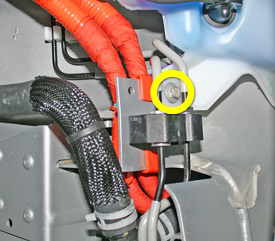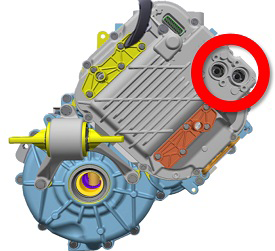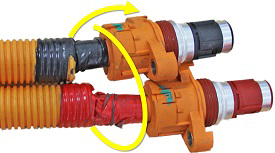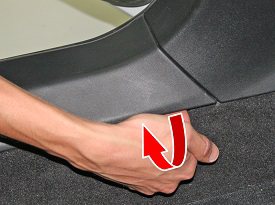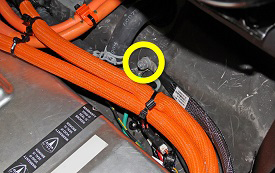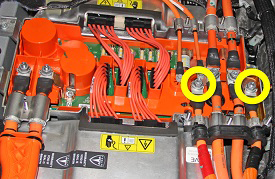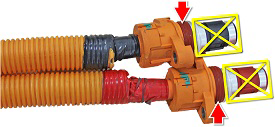Removal
- Perform the vehicle electrical isolation procedure (refer to procedure).
- Remove the high voltage junction box (HVJB) cover (refer to procedure).
Warning: Use a multimeter to check voltages across the HV cables and
to ground before continuing this procedure.
- Remove the front LH wheel arch liner (refer to procedure).
- Remove the bolt that secures the HV harness to the bracket in the front left wheel arch (torque 4 Nm). Release the HV harness from the bracket.
- Remove and discard the screws (x4) that secure the B+ and B- HV cables to the front drive unit (torque 7 Nm).
- Release any push clips that secure the HV harness to studs on the bulkhead.
- Install protective caps over both HV cables to protect the terminals and seals.
-
Secure the HV cables to the nylon fish tape tool using string or fishing
line.
Note: The nylon fish tape tool is used to pull and route the new harness through the channel during installation.Note: Secure both HV cables together and slightly staggered to reduce the likelihood of one of them getting caught in the channel.Note: The following image shows the HV cables without the protective caps installed.
- Lower the vehicle.
-
Release the front of the LH C-pillar lower trim panel near the base of the
B-pillar.
Caution: Take care not to damage component(s).
- Fold the carpet inboard to expose the entrance to the channel that runs along the left rocker panel.
-
Gently pull the HV harness towards the rear of the vehicle and through the
channel.
Caution: Ensure that the string or fishing line is not accidently released from the HV cables while pulling the nylon fish tape tool through the channel.
- Once the HV harness is all the way through the channel, release the string or fishing line, but do not pull the nylon fish tape tool back through the channel or remove it from the vehicle.
- Disconnect the 12V connector from the HVIL switch.
- Remove the bolts (x3) that secure the fuse bracket (torque 9 Nm).
- Remove the bolt that secures the HV fuse ground to the body (torque 5.5 Nm).
-
Remove the nuts that secure the B+ and B- HV cables to the HVJB (torque 9
Nm).
Note: It is not necessary to replace the fastener(s) after it is removed. The threaded area has a reusable dry sealant, which looks similar to adhesive patch material.
- Pull the front of the harness through the grommet between the seat base and 2nd row cabin.
- Remove the HV harness and fuse assembly from the vehicle.
